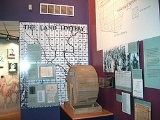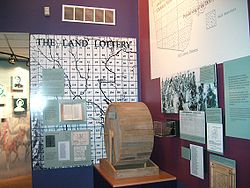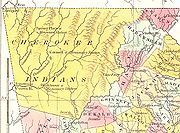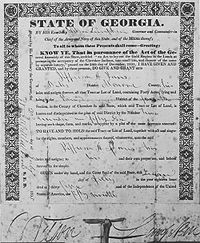
Georgia Land Lottery
Encyclopedia

Cherokee Nation (19th century)
The Cherokee Nation of the 19th century —an historic entity —was a legal, autonomous, tribal government in North America existing from 1794–1906. Often referred to simply as The Nation by its inhabitants, it should not be confused with what is known today as the "modern" Cherokee Nation...
. The lottery system was utilized by the State of Georgia between the years 1805 and 1832. Although some other states used land lotteries, none were implemented at the scale of the Georgia contests.
Land lots were surveyed in five different sizes based on the perceived quality of the land. In 1805, land lots were 202.5 acre (0.81948915 km²) and 490 acres (2 km²). In 1807, land lots were 202.5 acre (0.81948915 km²). In 1820, land lots were 250 acres (1 km²) and 490 acres (2 km²). In 1821, land lots were 202.5 acre (0.81948915 km²). In the 1832 Land Lottery area, land lots were 160 acre (0.6474976 km²), while in the 1832 Gold Lottery area, land lots were 40 acre (0.1618744 km²).
Prior to 1803, Georgia distributed land via a headright system. Though designed to prohibit corruption, that system actually encouraged it. During early administrations, the government abused this system and created what today is generally known as the Yazoo land scandal
Yazoo land scandal
The Yazoo land scandal, Yazoo fraud, Yazoo land fraud, or Yazoo land controversy was a massive fraud perpetrated from 1794 to 1803 by several Georgia governors and the state legislature. They sold large tracts of land in what is now the state of Mississippi to political insiders at very low prices...
. The much-abused "headright" system resulted in the adoption of the lottery system in May 1803, under governor John Milledge. The first lottery under the new system occurred in 1805. For each person subscribing to a lottery, a ticket was placed in the barrel or wheel. Since each lottery was over-subscribed, tickets were added to compensate for the over-subscription.

George Rockingham Gilmer
George Rockingham Gilmer was an American statesman and politician. He served two non-consecutive terms as the 34th Governor of Georgia, the first from 1829 to 1831 and the second from 1837 to 1839...
(who wished to reserve the Cherokee land, which contained several gold mines, for the State of Georgia, in order to pay for government projects and reduce taxes), and Wilson Lumpkin
Wilson Lumpkin
Wilson Lumpkin was a governor of Georgia, and a United States Representative and Senator.-Biography:Born near Dan River, Virginia, he moved in 1784 to Oglethorpe County, Georgia with his parents, who settled near Point Peter and subsequently at Lexington, Georgia...
, who strongly supported giving away the lands (in what would become the State's last three land lotteries).

Cherokee
The Cherokee are a Native American people historically settled in the Southeastern United States . Linguistically, they are part of the Iroquoian language family...
s (and other interested parties)—including John Ross, Samuel Worcester
Samuel Worcester
Samuel Austin Worcester , was a missionary to the Cherokee, translator of the Bible, printer and defender of the Cherokee's sovereignty. He was a party in Worcester v...
, and Major Ridge
Major Ridge
Major Ridge, The Ridge was a Cherokee Indian member of the tribal council, a lawmaker, and a leader. He was a veteran of the Chickamauga Wars, the Creek War, and the First Seminole War.Along with Charles R...
—took their fight against the State of Georgia to the United States Supreme Court. There were two major cases heard by the Court, during the years 1831 through 1832: Cherokee Nation v. Georgia
Cherokee Nation v. Georgia
Cherokee Nation v. Georgia, , was a United States Supreme Court case. The Cherokee Nation sought a federal injunction against laws passed by the state of Georgia depriving them of rights within its boundaries, but the Supreme Court did not hear the case on its merits...
and Worcester v. Georgia
Worcester v. Georgia
Worcester v. Georgia, 31 U.S. 515 , was a case in which the United States Supreme Court vacated the conviction of Samuel Worcester and held that the Georgia criminal statute that prohibited non-Indians from being present on Indian lands without a license from the state was unconstitutional.The...
. Though the Cherokee Nation
Cherokee Nation (19th century)
The Cherokee Nation of the 19th century —an historic entity —was a legal, autonomous, tribal government in North America existing from 1794–1906. Often referred to simply as The Nation by its inhabitants, it should not be confused with what is known today as the "modern" Cherokee Nation...
actually won the court battles, both U.S. President Andrew Jackson
Andrew Jackson
Andrew Jackson was the seventh President of the United States . Based in frontier Tennessee, Jackson was a politician and army general who defeated the Creek Indians at the Battle of Horseshoe Bend , and the British at the Battle of New Orleans...
and the State of Georgia chose instead to ignore the Supreme Court ruling. Georgia continued its surveying and division of the Cherokee lands through the final "1832 Land and Gold Lotteries". President Jackson made use of the U.S. Army, forcing the "removal of the Cherokees
Cherokee removal
Cherokee removal, part of the Trail of Tears, refers to the forced relocation between 1836 to 1839 of the Cherokee Nation from their lands in Georgia, Texas, Tennessee, Alabama, and North Carolina to the Indian Territory in the Western United States, which resulted in the deaths of approximately...
.
Land speculation in the lotteries was common. Many lots were sold sight-unseen by the winners for other lots or for gold. Real estate agents, individual citizens, and even unscrupulous lottery officials attempted in every way imaginable to secure promising gold belt lots or valuable Cherokee plantation lots. During the 1832 Lottery alone, some 85,000 people competed for 18,309 land lots to be given away, and at least 133,000 people competed for 35,000 gold belt lots to be given away. During the 27 years that the State of Georgia used the lottery system, the rules and the methods of the system remained virtually unchanged. Lottery fees depended on the winning ticket and the size of the lot won, but in general, they only covered the cost of running the lottery. The State did not directly profit from allocating these lands. Fractional lots were sold in each of the lotteries, and some lands, especially those near major rivers, were exempt from the lottery. These were distributed by the State at public auctions.
Lotteries
- 1805 Land Lottery — This encompassed Creek Indian lands just west of the Oconee RiverOconee RiverThe Oconee River is a river which has its origin in Hall County, Georgia, and terminates where it joins the Ocmulgee River to form the Altamaha River near Lumber City at the borders of Montgomery County, Wheeler County, and Jeff Davis County. South of Athens, two forks, known as the North Oconee...
ceded to the state in 1802 and a small strip of land in the southeast section of the state. - 1807 Land Lottery — Included additional Creek lands.
- 1820 Land Lottery — After the Creek War (1814)Indian WarsAmerican Indian Wars is the name used in the United States to describe a series of conflicts between American settlers or the federal government and the native peoples of North America before and after the American Revolutionary War. The wars resulted from the arrival of European colonizers who...
, President Jackson demanded from the Creeks an immense area of land which would become the southern third of the entire state of Georgia. A second section of land in northeast Georgia was included. This other, smaller section defined the eastern end of the Cherokee Nation for 12 years. - 1821 Land Lottery — Further Creek cessions which included the future site of Atlanta.
- 1827 Land Lottery — Signaled the end of the Creek Indians in Georgia.
- 1832 Land Lottery — This lottery, along with the 1832 Gold Lottery, gave the Cherokee Nation to Georgia settlers. Sparked the "Trail of TearsTrail of TearsThe Trail of Tears is a name given to the forced relocation and movement of Native American nations from southeastern parts of the United States following the Indian Removal Act of 1830...
." - 1832 Gold LotteryGold Lottery of 1832The Gold Lottery of 1832 was the seventh lottery in the Georgia Land Lottery, a lottery system used by the State of Georgia between the years 1805 and 1832 to distribute land. It was authorized by the Georgia General Assembly by an act of December 24, 1831 a few years after the start of the...
— By the time of the gold lottery the Georgia Gold RushGeorgia Gold RushThe Georgia Gold Rush was the second significant gold rush in the United States. It started in 1828 in the present day Lumpkin County near county seat Dahlonega, and soon spread through the North Georgia mountains, following the Georgia Gold Belt. By the early 1840s, gold became harder to find...
was already beginning to wind down. The state did not guarantee that gold existed on the lots given away. - 1833 Fractions Lottery — The State of Georgia held one final land lottery in December, 1833, to distribute fractions from the Cherokee territory and other remaining lots not drawn in previous lotteries.
External links
- Land Lotteries from the state of Georgia ArchivesGeorgia ArchivesThe Georgia Archives is the official repository of archival records for the U.S. state of Georgia. Together with the Georgia Capitol Museum it forms the Georgia Division of Archives and History, part of the office of the Secretary of State of Georgia. It is located in Morrow, Georgia, United States...
- 1805 Georgia Land Lottery from 1805georgialandlottery.com
- 1807 Georgia Land Lottery from 1807georgialandlottery.com
- Georgia Land Lottery from ngeorgia.com
- Land Lottery Records from rootsweb.com/~usgenweb
- Land Lottery Records from georgiagenealogy.org

